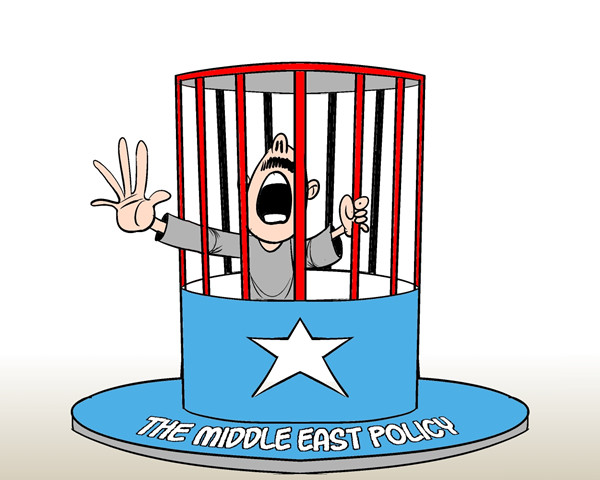New type of relations between two great reactive powers in the Middle East
- By Jin Liangxiang
 0 Comment(s)
0 Comment(s) Print
Print E-mail chinausfocus.com, November 14, 2013
E-mail chinausfocus.com, November 14, 2013
Over the last decade, the world has witnessed the significant shift in the U.S. role in the Middle East from being dominant to reactive. Previously, to maintain its hegemony in the region, the U.S. did not hesitate to reverse the actions of Middle East countries for its own interests, control the trends of regional development in its own favor or even to impose certain outcomes to accommodate its own needs.
|
|
|
The tender trap [By Jiao Haiyang/China.org.cn] |
The United States’ pro-active Middle East policy was most prominent in the 1990s. In 1991, the U.S. rallied a coalition of multiple forces – even from Russia and Syria, two of its major opponents in the region – to push Saddam Hussein back to Iraq. In 1993, it brokered a peace treaty between Palestinians and Israelis. The military operation against Hussein and the signing of the Palestine-Israel peace treaty allowed the U.S. to contain both Iraq and Iran in the east front of the Middle East.
The U.S. maintained its aggressive and dominant posture in the Middle East until the early 21st century, as characterized by wars in Afghanistan and Iraq. Nevertheless, American influence has been waning ever since, and its recent policy in the region is largely reactive than pro-active. The U.S. no longer leads or controls regional developments; it simply accepts the outcomes and attempts to minimize the negative effects the regional events may have on its national interests.
Though the U.S. is still committed to “stand on the right side of history”, President Obama averted U.S. military involvement in Libya and Syria. In addition, he has put too little pressure on Israel to drive the peace process and is yet to break through the nuclear stalemate with Iran.
While some experts attribute the reactive nature of the current U.S. Middle East policy to its power decline, there are, in fact, multiple factors behind the dramatic change. First of all, the Obama administration is now focusing all its strength on addressing domestic priorities such as a budget agreement and raising the debt ceiling. Also, the current U.S. administration would prefer to direct more strategic resources toward Asia-Pacific area than the Middle East, as its interests in the latter significantly decreased due to the technological innovation in shale gas.






